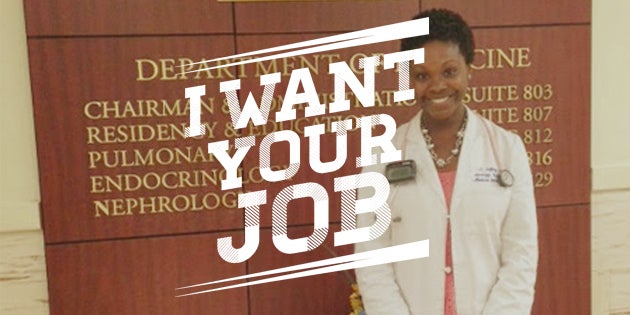Aundrea Loftley ’06 is well on her way to being a leading expert in treating diabetes. Currently an internal medicine physician at the Medical University of South Carolina (MUSC), she eventually hopes to travel to medically-unserved regions of the world and help establish facilities to treat diabetes.
Q: What is your job title and how would you describe your job?
A: I am a board certified internal medicine physician and currently an endocrinology fellow at MUSC. Basically, a “fellow” is a physician who is training to become a specialist.
My job is to diagnose and treat diseases that affect the endocrine system. Conditions include diabetes mellitus, thyroid disease, metabolic bone-disease, tumors affecting endocrine glands and reproductive hormone deficiencies.
RELATED:Harvard researchers discover a new treatment for diabetes.
Q: What was your path from the College to where you are now?
A: At the College, I majored in biology with an emphasis in molecular biology and minored in chemistry. I then attended medical school at MUSC for four years to become a medical doctor. I did a one-year internship in internal medicine and a two-year residency in internal medicine, both at MUSC. I also passed the ABIM (American Board of Internal Medicine) board certification. At this point, I could have entered practice as a general internist, but I chose to subspecialize by entering a fellowship. Right now I’m in the middle of my two-year fellowship in endocrinology.
RELATED: Learn more about the endocrinology fellowship at MUSC.
Q: Why did you choose a fellowship over being a general internist?
A: General internists treat patients with diseases that affect all organ systems. I admire general internists because they have to be good at treating many different things and they see a little bit of everything.
Physicians pursue fellowship when they wish to subspecialize in a particular medical or surgical-area of interest. Fellowships are available in most areas of medicine. I have always performed best when able to narrow my focus and develop skills for a specific purpose. This goal-directed style of learning is what helped me decide to pursue fellowship.
Q: How did the College of Charleston prepare you for medical school?
A: The science curriculum is very strong at CofC and I was prepared for medical school. While majoring in the sciences will provide the preparation needed to do well on the MCAT, involvement in extracurricular activities and learning to prioritize also plays a major role in preparation for medical school. The volume of study material in medical school is quite large and can at times be overwhelming, but I learned how to handle it in college, so I knew how to integrate a healthy life-style (balanced diet, exercise and spending time with family/friends) with learning the material in the syllabus.
RELATED: Learn more about the College’s pre-health track.
Q: If students are interested in medical school, do you recommend majoring in biology?
A: While biology was the major that was right for me, I never discourage non-science majors from pursuing careers in medicine. In fact, several of my classmates obtained their degrees in other areas. If you don’t major in the sciences, I recommend taking pre-requisite courses in the sciences that will prepare you for the MCAT and for the basic science years of medical school. Clinical exposure to the field of medicine through shadowing and volunteer-work is also important for all students interested in medicine.
Q: What is your favorite part about your job?
A: Interacting with my patients is the best part of my day. No two patients are alike, even if they have the same disease. This is why listening and searching for the elements that make each patient’s case unique is essential. Medical school taught me the clinical features of disease but my patients have taught me how to treat disease. I am grateful and humbled each day by my patient’s willingness to share and trust me with their experiences.
The most rewarding part of my job is seeing my patients accomplish their personal goals and improve their quality of life once the underlying medical conditions are better controlled and in some cases cured.
Q: Where do you see yourself in the future?
A: My goal short-term is to establish a successful practice in endocrinology and work to reduce the complications associated with diabetes mellitus in the Charleston region.
My big dream is to travel abroad and help establish medical facilities designed to treat diabetes in medically-unserved regions of the world. WHO projects that diabetes will be the 7th leading cause of death in 2030 and 347 million people worldwide have diabetes.
Within the Southeastern U.S., I would love to travel to communities that are medically underserved and to establish programs that will help improve health literacy, promote healthy lifestyle and ultimately help reduce the incidence of diabetes mellitus and disease-related complications.
Q: What advice do you have for students interested in the medical profession?
A: Make your education your priority: Have fun in college but remember that you can only party as hard as you study.
It is important to volunteer and/or shadow physicians. You will grow and these experiences can help reaffirm your desire to pursue medicine. The knowledge and skills learned through these interactions is invaluable. This exposure will make you better prepared for medical school.






